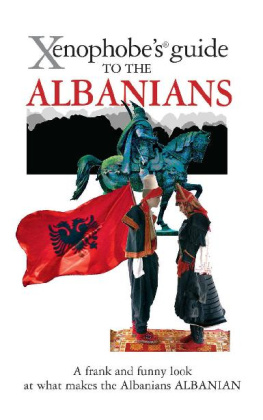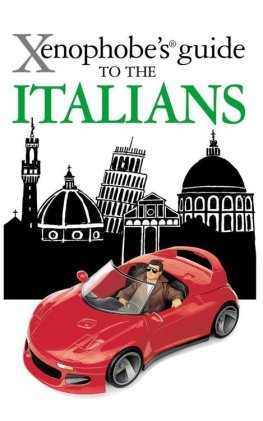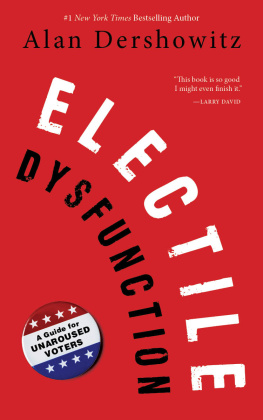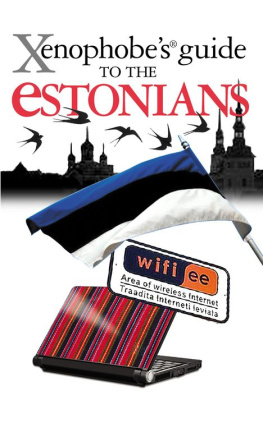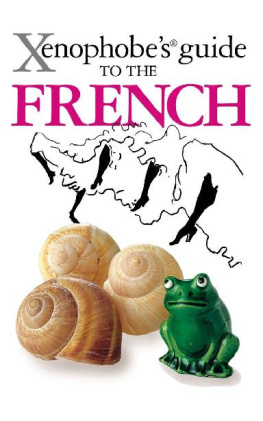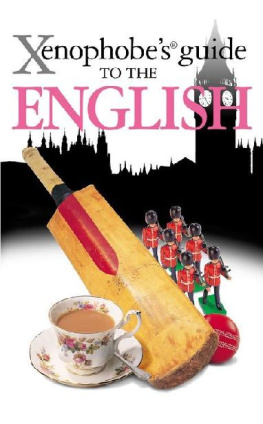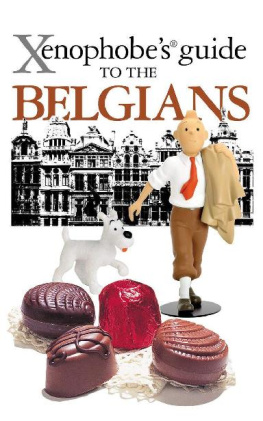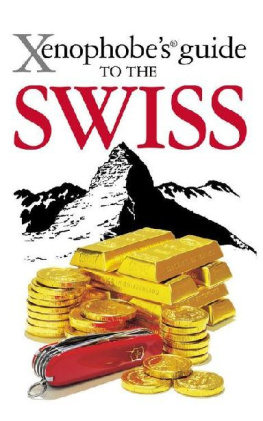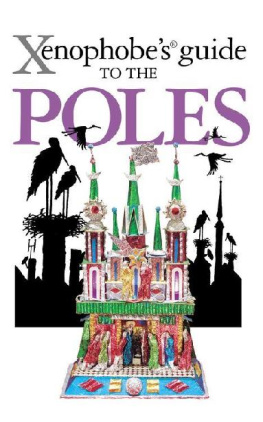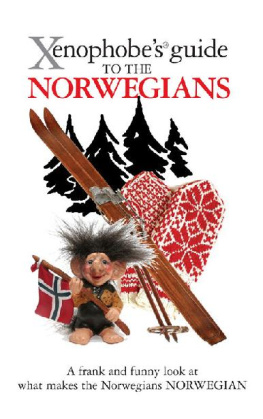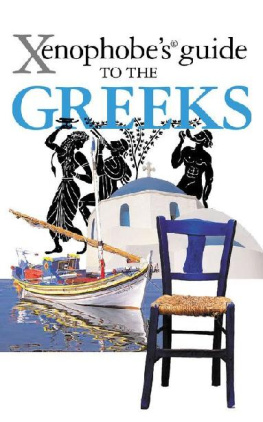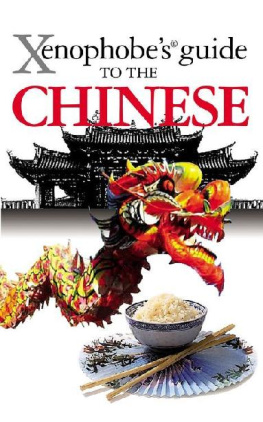Alan Andoni - Xenophobe’s Guide to the Albanians
Here you can read online Alan Andoni - Xenophobe’s Guide to the Albanians full text of the book (entire story) in english for free. Download pdf and epub, get meaning, cover and reviews about this ebook. City: Array, year: 2015, publisher: Oval Projects, genre: Home and family. Description of the work, (preface) as well as reviews are available. Best literature library LitArk.com created for fans of good reading and offers a wide selection of genres:
Romance novel
Science fiction
Adventure
Detective
Science
History
Home and family
Prose
Art
Politics
Computer
Non-fiction
Religion
Business
Children
Humor
Choose a favorite category and find really read worthwhile books. Enjoy immersion in the world of imagination, feel the emotions of the characters or learn something new for yourself, make an fascinating discovery.
- Book:Xenophobe’s Guide to the Albanians
- Author:
- Publisher:Oval Projects
- Genre:
- Year:2015
- City:Array
- Rating:3 / 5
- Favourites:Add to favourites
- Your mark:
- 60
- 1
- 2
- 3
- 4
- 5
Xenophobe’s Guide to the Albanians: summary, description and annotation
We offer to read an annotation, description, summary or preface (depends on what the author of the book "Xenophobe’s Guide to the Albanians" wrote himself). If you haven't found the necessary information about the book — write in the comments, we will try to find it.
Xenophobe’s Guide to the Albanians — read online for free the complete book (whole text) full work
Below is the text of the book, divided by pages. System saving the place of the last page read, allows you to conveniently read the book "Xenophobe’s Guide to the Albanians" online for free, without having to search again every time where you left off. Put a bookmark, and you can go to the page where you finished reading at any time.
Font size:
Interval:
Bookmark:

Published in eBook form by Xenophobes Guides.
Telephone: +44 (0)20 7733 8585
E-mail: info@xenophobes.com
Web site: www.xenophobes.com
Copyright Xenophobes Guides Ltd. This e-Book edition is copyright material and must not be copied, reproduced, transferred, distributed, leased, licensed or publicly performed or used in any way except as specifically permitted in writing by the publishers as allowed under the terms and conditions under which it was purchased or as strictly permitted by applicable copyright law. Any unauthorised distribution or use of this text may be a direct infringement of the publishers rights, and those responsible may be liable in law accordingly.
Xenophobes is a Registered Trademark.
Editor Catriona Tulloch Scott
Series Editor Anne Taut
Cover design Jim Wire & Vicki Towers
Grateful thanks are given to Dr Robert Elsie for his translation of the verse on page 35 from Fshati im by Andon Zako ajupi published in Baba-Tomorri, Cairo 1902.
Cover: Tribute for the mannequins in Albanian costume is paid to Albaniaheritage.com.
ePub ISBN: 9781908120960
Mobi ISBN: 9781908120977
Print ISBN: 9781906042189
Contents

The population of Albania is just over 3 million, compared with 11 million Greeks, 61 million Italians, 63 million British and 318 million Americans.
Albania is a little bit bigger than Sicily, and could fit into France 20 times.
Nationalism & Identity
Pride and prejudice
Albanians will tell you that they are proud to be Albanians. What they wont tell you is why. Some will mention the national hero Skanderbeg, some the Illyrian tribes (from whom they are descended), some the language (the oldest in Europe), and some Mother Teresa (an ethnic Albanian). The remarkable landscape might also be mentioned. However, the plain fact is that nobody really knows.
On the other hand, they are aware of their reputation. Some are ready to describe themselves (or rather other Albanians) as lazy, corrupt, more interested in drinking coffee than working. Some present their country as spoilt, decaying and in disrepair and their dream is to live outside the country. A common phrase is Shqiperia nuk behet me Shqiptare, Albania cannot become [move ahead] with Albanians.
A common phrase is Albania cannot become with Albanians.
The more insightful point out that the nation managed to maintain its language, culture and identity (albeit heavily influenced by outsiders) for two millennia, endured persistent invasions by its neighbours, and occupation and administration by the Ottoman Turks for up to five centuries. They can also cite the Albanians ability to emerge after 40 years of the excesses of the communist regime and to survive under a succession of (it is said) inept, selfserving governments for a further 20. In the end, the flag of the black eagle on the red background and the national anthem (composed by a Romanian) give rise to a fulsome patriotism which galvanises a strong feeling of raw, unbridled pride that pays no heed to intellectual rationalisation. As in many nations, symbolic representations and slogans can eclipse meaningful thought.
History matters
If Albanians look to the future, it is to the immediate future for they have no faith in anything further ahead. As such, history plays a role in self-definition.
In ancient times Albania was called Illyria and its tribes stretched as far north as presentday Slovenia. Though it has no counterpart today, the concept of Illyria is a cornerstone of identity for all Albanians, a large number of whom are located on its borders in Southern Montenegro, Western Macedonia, Northern Greece and in Kosovo where they form the majority ethnic group.
Albanians look to the immediate futurefor they have nofaith in anything further ahead.
The Albanians recent history is a little more ambiguous. There is a general consensus that the communist era was bad because it limited freedom, because the population couldnt travel abroad, and because people were sent to prison camps though there is seldom any focus on detail. Albania is one of the few communist countries that (as yet) does not have a museum entirely dedicated to the victims of communism. The tangible legacy of the era is the concrete bunkers, 700,000 of which were built from 1967 until 1985; the intangible legacy is harder to assess. The house of the former dictator, the late and largely unlamented Enver Hoxha, still stands as a triumph of conceit over aesthetics in a corner of the Bloku, a part of the capital Tirana, originally reserved exclusively for the political elite. Some wonder whether the dictator is still there, twitchily peering out between the curtains, watching the people spill in and out of the bars and wondering what happened to his great experiment in Utopia.
The house of the former dictator still stands as a triumph of conceit over aesthetics.
How others see them
Foreign observers of Albanians can be divided into two categories: those who have never been to Albania, and those who have.
The former know only the negative stories of blood feuds, prostitution, drugs, violence and general evil. One commentator cynically put it that those in power might be happy with this negative view by outsiders since the fewer foreigners coming to Albania, the stronger their hold on society. The latter, those who venture to Albania, are pleasantly surprised, not least because their expectations are low. They find all the positives that are omitted in the general narrative.
By and large, Albanians are viewed either as victims or as potential criminals. But Lord Byron admired Albanian courage and the anthropologist Edith Durham, aredoubtable British lady who spent much time travelling in the north of Albania at the beginning of the 20th century, developed a great respect for Albanian traditions, notably ndera honour, and besa trust. She felt that they had not been treated well by the world community. This is a view echoed by many Albanians.
By and large, Albanians are viewed either as victims or as potential criminals.
Albanias nearest neighbours are not so overwhelming in their affection for Albanians. Some of them lay claim to Albanian territory, and some have observed that their countries host a large influx of Albanian immigrants who, it might be argued, take the jobs of the locals. However, others acknowledge that Albanians are merely doing the jobs that the locals dont want to do.
Meanwhile, the views of foreigners actually living in Albania are often coloured by the differences between their cultures. For example, the Japanese feel uneasy about the lack of collective effort for the common good, the Swiss complain of the absence of order, and the Germans grumble about the endemic breaking of rules.
What is certain is that Albanians, while welcoming outsiders, have an inbuilt need to preserve their identity from outside influence. They have managed to do so for centuries and have every intention of continuing to do so in this one.
How they see themselves
The Albanians believe they are the smartest people in the world, and it is the combined effects of history, fate, terrible governments and rapacious neighbours that have conspired to keep them down.
The word i zgjuar(smart) has a particular resonance.
The word i zgjuar (smart) has a particular resonance. It is about outsmarting others. It is the ability to get one over on your enemy or anybody who is not your friend or family. It is the ability to reach an objective by the fastest, most convenient means even if it entails excluding an important detail. It is getting in front of somebody at a set of traffic lights. Albanians have a grudging respect for rich, successful people, because they are obviously
Next pageFont size:
Interval:
Bookmark:
Similar books «Xenophobe’s Guide to the Albanians»
Look at similar books to Xenophobe’s Guide to the Albanians. We have selected literature similar in name and meaning in the hope of providing readers with more options to find new, interesting, not yet read works.
Discussion, reviews of the book Xenophobe’s Guide to the Albanians and just readers' own opinions. Leave your comments, write what you think about the work, its meaning or the main characters. Specify what exactly you liked and what you didn't like, and why you think so.

